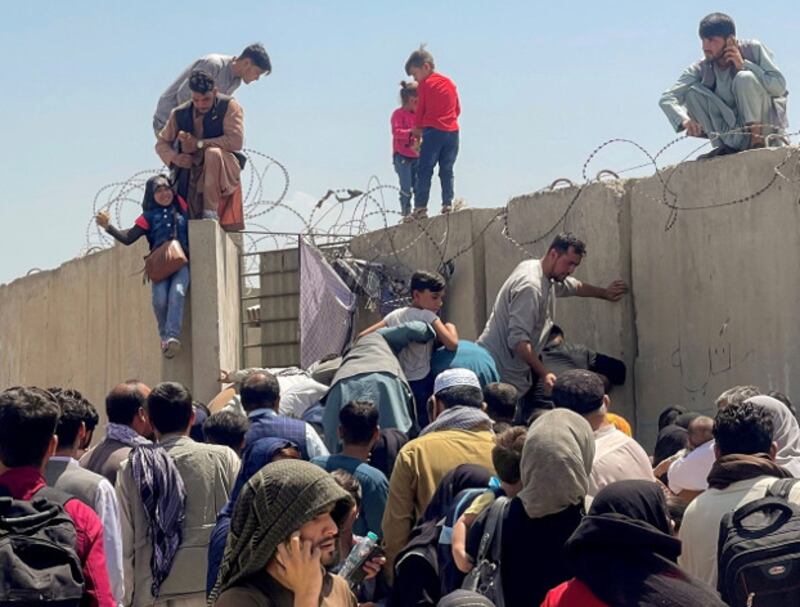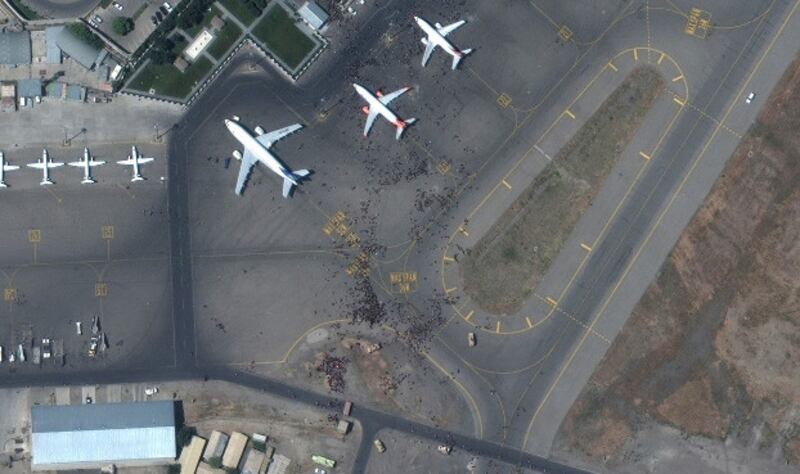The Philippines, Bangladesh, and Indonesia said Monday they were trying to evacuate their citizens from the chaos-filled capital of Afghanistan following its takeover by Taliban insurgents.
The Afghan government collapsed over the weekend after President Ashraf Ghani fled the country just before the Taliban took over Kabul without resistance. Dozens of governments across the globe asked to be allowed to repatriate their nationals, with some nations shutting down their embassies.
"We are calling on the relatives of our fellow Filipinos in Afghanistan ... get in touch with the Philippines Embassy so you can be repatriated," Presidential spokesman Harry Roque told BenarNews.
The Philippines government said it was repatriating about 130 Filipinos from Afghanistan, with 32 already evacuated to Doha, and a group of 19 Filipinos set to leave on Monday.
Members of the Taliban have been fighting to regain power since their ouster from Kabul after a U.S.-led offensive in 2001, prompted by the worst-ever terror attacks on American soil on Sept. 11 of that year.
Between Aug. 6 and 14, just weeks after the withdrawal of U.S. and international troops from the country, all major cities fell to the Taliban in quick succession.
Taliban fighters were seen patrolling the streets of Kabul on Monday. There were chaotic scenes at the airport as thousands of Kabul residents flooded the tarmac, trying to flee Taliban rule. Some even tried hanging onto an airplane as it was taking off, according to news reports and videos shared on social media.

Roque said the Filipino government had raised its alert for Afghanistan to the highest level, 4, which mandates repatriation but refused to answer whether the government would recognize the Taliban government.
“It is up for the Department of Foreign Affairs to address,” Roque said.
Bangladesh’s foreign minister, A.K. Abdul Momen, told BenarNews that the government had asked the NGO BRAC, which has worked in 10 provinces of Afghanistan for the last 19 years, to evacuate all foreign staff last month.
Imran Ahmad, minister for expatriates’ welfare and overseas employment, told BenarNews that there were no Bangladeshi migrant workers in Afghanistan.
Shameran Abed, the executive director for BRAC International, said that three Bangladeshi staff were on their way home, while six were expected to return on Aug. 22.
Bangladesh has diplomatic ties with Afghanistan, but no resident mission in the country.
The foreign ministry also issued a statement asking all stakeholders in Afghanistan to “maintain peace and calm, ensuring safety and security of all including foreign nationals.”
“Bangladesh is carefully observing the fast evolving situation in Afghanistan,” the statement said.
“Bangladesh believes that a democratic and pluralistic Afghanistan as chosen by its people is the only guarantee of stability and development in the country. In this regard, Bangladesh considers itself a potential development partner and a friend of Afghanistan,” the statement said.

Meanwhile, Indonesia said it would not be closing its embassy in Kabul even as news reports showed countries including Russia, China, Turkey, and Pakistan rushing to close theirs.
“Indonesia is closely monitoring the rapid developments taking place in Afghanistan,” a foreign ministry statement said.
There are 15 Indonesians in Afghanistan, including U.N. workers and those married to Afghans, and evacuation efforts were underway to evacuate them, as well as the staff of the Indonesian Embassy in Kabul, the ministry said.
“The Indonesian Embassy in Kabul will be run by essential staff while monitoring the security situation in Afghanistan,” the statement said.
“Indonesia hopes that a political settlement that is Afghan-owned, Afghan-led can be achieved … Indonesia continues to communicate with all parties in Afghanistan, including with U.N. and foreign representatives.”
Originally a group of Islamic students tired of the civil war waged by warlords in the early 1990s, the Taliban took up arms and ruled Afghanistan from 1996 to 2001 under an extremely strict interpretation of Islam. Under their rule, women were banned from going to school or working, and Al-Qaeda was able to establish a foothold in the country and plan the 9/11 attacks.
Subel Rai Bhandari contributed to this report from Kathmandu.
